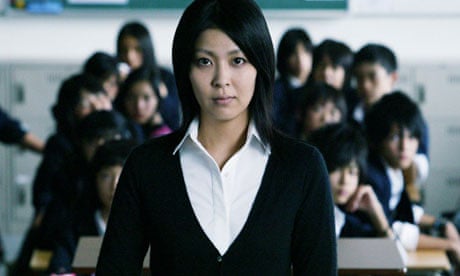Tetsuya Nakashima's Confessions is a film with a vast number of admirers, for whom it is a super-cool horror to be compared with Kinji Fukasaku's Battle Royale or Park Chan-wook's Lady Vengeance. I have to say that, despite its effective opening premise and some interestingly spacey mood-alterations and tonal shifts, I found it overcooked and overwrought, and sometimes quite implausible – a tale oddly recounted often at second hand, and in flashback.
Takako Matsu plays Moriguchi, a schoolteacher and single mother. The opening scenes show her announcing her retirement to an unruly, disorderly class finishing up their school milk and throwing the cartons everywhere. She has apparently lost all control. Her speech might as well also be a kind of embittered voiceover, happening only in her head.
Moriguchi has become profoundly disenchanted with teaching, and for a very specific reason: her four-year-old daughter, whom she was in the habit of leaving in the school creche during the working day, was recently found dead in the school's swimming pool. Moriguchi announces that she knows two of her pupils murdered the child. Enraged by the certainty that as minors they will never face any real legal penalty, she reveals to the stunned class that she has secretly mixed HIV-infected blood into the milk of the guilty pair. She says they will soon develop the disease and endure a living hell. The horror and revulsion that this claim causes spreads through the class – spores of fear, hate and paranoia proliferate.
It is a strange sort of melodrama-cum-horror, coloured with emo listlessness and despair. Periodically, the action shifts into slo-mo dreaminess, drifting to an ambient soundscape of melancholy – there is an interesting soundtrack from Radiohead, among others. Moriguchi's successor, a dynamic young man determined to be the pupils' friend, is called Werther; he explicitly denies having the "sorrows" of his operatic namesake, but it is another contributor to the teenage moodiness.
The problem is that despite the simplicity of that initial horrifying invention, the film becomes loaded with elaborate backstories: the means by which Moriguchi is supposed to have discovered the truth about her daughter's death is not convincing, and the plot even involves a colossally powerful and wildly improbable "time bomb" with a digital countdown meter, worryingly like the one in Goldfinger. The sheer implausibility of this tangled plot, disclosed through a slightly inert series of "confessions" makes it, for me, intractable and even slightly dull at moments. But there are sharp prickles of fear and gloom.

Comments (…)
Sign in or create your Guardian account to join the discussion